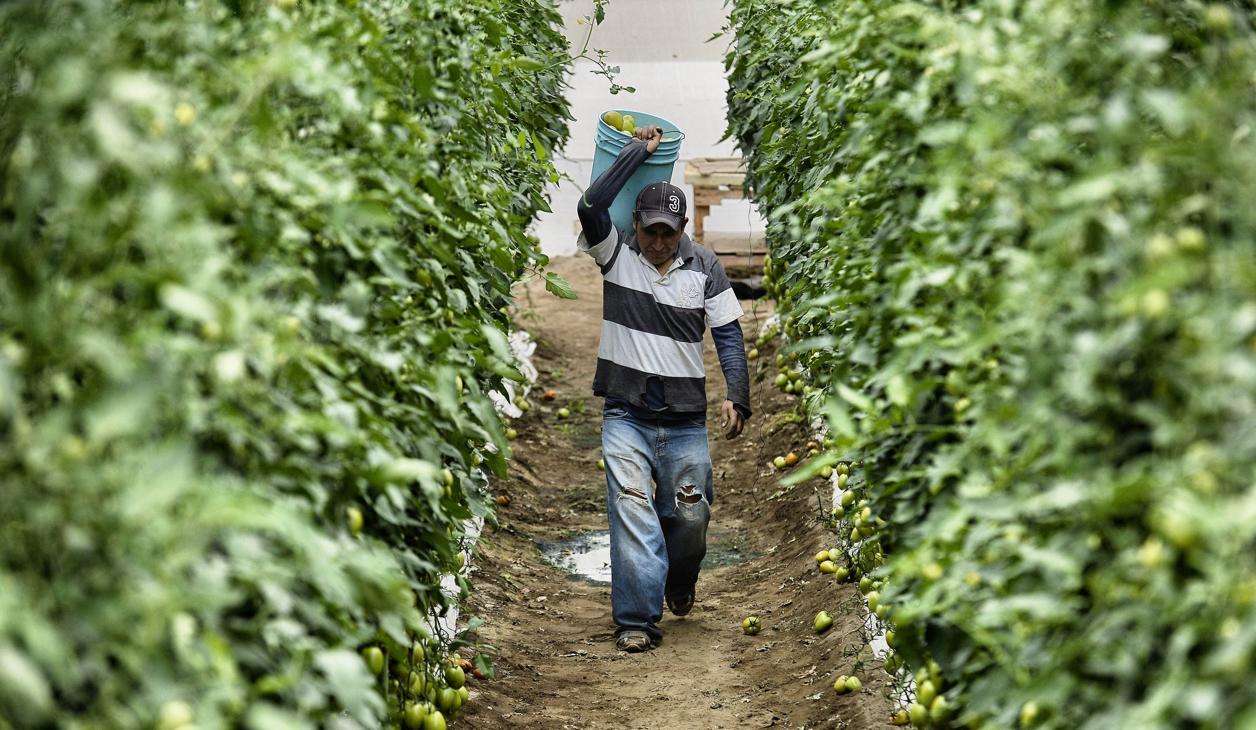There’s feces-covered cilantro in your guacamole because of labor abuses in Mexico
A farm laborer works at a tomato field in Los Pinos, San Quintin Valley, Baja California State, Mexico on April 23, 2015.
The US Food and Drug Administration has announced a partial ban on cilantro imported from Mexico because of fecal contamination, and most people are reacting in one of three ways.
Gross, I ate poop.
Oh no, what an inconvenience for me.
And, who cares, cilantro is disgusting.
The thing most people are missing is that this story isn't just about contaminated cilantro making Americans sick and the FDA taking measures to stop it. It's about exploitative labor conditions that led to the contamination and about the economic realities that sustain those conditions — like the fact that Americans like cheap cilantro and other agricultural products.
Let's take a step back and look at how this all went down, according to an import alert released by the FDA on Tuesday.
It all started a few years ago with some diarrhea, which turned out to be cyclosporiasis — a parasitic infection in the small intestine that causes, as the Centers for Disease Control and Prevention describes it, "watery diarrhea, with frequent, sometimes explosive, bowel movements." The parasite, cyclospora cayetanensis, usually finds its way into a person's gut when that person unknowingly ingests human feces. You know, like feces on cilantro.
The CDC and state health agencies figured out that some cases of cyclosporiasis were related, and that these illness clusters indicated there were recurring, annual outbreaks of a cyclosporiasis taking place between the months of April and August in the United States since 2012. The CDC, FDA, and state agencies were able to trace the outbreaks back to shipments of cilantro from the state of Puebla, Mexico. The FDA partnered with two Mexican regulatory agencies — Servicio Nacional de Sanidad, Inocuida y Calidad Agroalimentaria (SENASICA) and the Comision Federal para la Proteccion contra Riesgos Sanitarios (COFEPRIS) — to carry out inspections of the 11 farms and packing houses that produce cilantro in Puebla.
According to the FDA alert, here's what the inspections uncovered at eight of the sites, including all five of the ones directly connected to the US illness clusters.
Conditions observed at multiple such firms in the state of Puebla included human feces and toilet paper found in growing fields and around facilities; inadequately maintained and supplied toilet and hand washing facilities (no soap, no toilet paper, no running water, no paper towels) or a complete lack of toilet and hand washing facilities; food-contact surfaces (such as plastic crates used to transport cilantro or tables where cilantro was cut and bundled) visibly dirty and not washed; and water used for purposes such as washing cilantro vulnerable to contamination from sewage/septic systems. In addition, at one such firm, water in a holding tank used to provide water to employees to wash their hands at the bathrooms was found to be positive for C. cayetanensis.
You might read that paragraph and think, "Wow, this is horrifying, I can't believe I might have eaten produce that came from conditions like this." But the reaction you should probably be having right now, and that not enough people are having judging from most press coverage of the FDA ban, is this:
"Wow, I can't believe these are the conditions in which Mexican agricultural laborers live and work."
The FDA ban hasn't just alerted us to a contaminated food product — it's given us a rarely seen (and often intentionally avoided) window into the labor that brings that food from the farm to our table. It's a window to a world where Mexican farm workers pick and process crops without access to clean water and toilet facilities.
And that's on top of all the other abuses these workers suffer.
If you want to learn more about the process by which farm goods like cilantro finds their way from the dirt to your guacamole, check out "Product of Mexico," an investigative series by the Los Angeles Times published in December 2014. The Times spent 18 months behind the scenes of the cross-border agribusiness boom that's led to the tripling of farm exports from Mexico to the United States over the past decade, and, you could say, an explosion of human hardship.
These were the Times' key findings:
- "Many farm laborers are essentially trapped for months at a time in rat-infested camps, often without beds and sometimes without functioning toilets or a reliable water supply.
- "Some camp bosses illegally withhold wages to prevent workers from leaving during peak harvest periods.
- "Laborers often go deep in debt paying inflated prices for necessities at company stores. Some are reduced to scavenging for food when their credit is cut off. It's common for laborers to head home penniless at the end of a harvest.
- "Those who seek to escape their debts and miserable living conditions have to contend with guards, barbed-wire fences and sometimes threats of violence from camp supervisors.
- "Major U.S. companies have done little to enforce social responsibility guidelines that call for basic worker protections such as clean housing and fair pay practices."
This is the real story of the FDA's cilantro import ban. But everyone is missing it.
We want to hear your feedback so we can keep improving our website, theworld.org. Please fill out this quick survey and let us know your thoughts (your answers will be anonymous). Thanks for your time!
